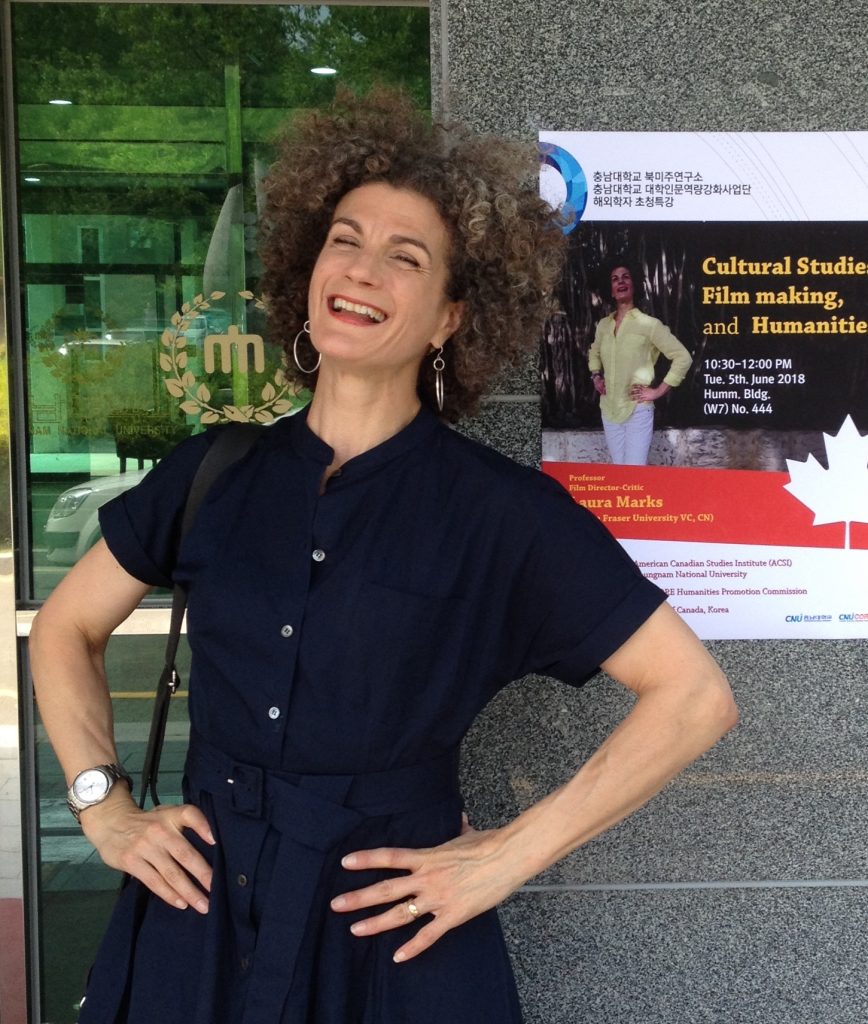Barbara Bolt : Laura U. Marks: Timothy Morton

Keynote presentation – Barbara Bolt. Shedding light and “glaring” truths.
9.00 – 10.30am Sunday 8th November 2020
Western metaphorics since the enlightenment have privileged the plenitude of light. In positing the cornucopia of Dark Eden of the “Contemporary” as a counter-enlightenment, the provocation of this
conference suggests that the plenitude of light has been replaced by a saturation in which light is sucked into the black hole of a networked world. This conceptualisation inverts the terms of the binary light/dark upon which enlightenment thinking was built, marking “dark” the privileged term.
LIGHT/FORM/KNOWLEDGE/TRUTH/REPRESENTATION/SUBJECT
DARK/MATTER/UNKNOWN/POST-TRUTH/SIMULACRUM/OTHER
Unpacking terms is important. Even in a counter-enlightenment move, the terms of a Dark Eden remain haunted by the unexamined terms of the European enlightenment. It is these terms that I wish to return to in order to rehearse an alternative model of mapping contemporaneity, one that is grounded in performativity (not performance). I will extend on earlier work to propose that a particular experience of the “glare” of Australian light serves to fracture the assumed nexus between light, form, knowledge, truth,
representation and subjectivity without flipping it into its binary—dark, matter, unknown, post-truth, simulacrum, other. The rupture of the “glare” prompts a move from shedding light ON the matter to shedding light FOR the matter and suggests an emergent embodied imaging rather than representationalism or pure simulacrum.
Barbara Bolt is the Director of the Victorian College of the Arts at the Faculty of Fine Arts and Music, The University of Melbourne. She is a practising artist and art theorist with special interests in ethics and artistic research. Her research addresses the dialogue between theory and practice and between digital and analogue painting seen through the lens of New Materialisms. Her publications include two monographs Art Beyond Representation (2004) and Heidegger Reframed (2011) and five co-edited books, The Meeting of Aesthetics and Ethics in the Academy: Challenges for Creative Practice Researchers in Higher Education (2019), Material Inventions: Applying Creative Arts Research (2014), Carnal Knowledge: Towards a “New Materialism” through the Arts (2013), Practice as Research: Approaches to Creative Arts Enquiry (2007) and Sensorium: Aesthetics, Art, Life (2007). Website: http://www.barbbolt.com/, Facebook: Barbara Bolt, Instagram: Barbara bolt
Laura U. Marks

Keynote presentation – Laura Marks: Seeing in the dark
9.00 – 10.30am Saturday 7th November 2020
This talk will argue in favor of seeing in the dark. To expect that media and other commodities are readily available for consumption ignores their costs, to people and the planet, not calculated in their price. I will argue it is more healthy, for individuals and the planet, to treat media works as precious. I will share my recent findings that streaming media are responsible for an alarming proportion of global greenhouse gas emissions. For the majority of platforms that run on fossil fuels, the ethical option is to stream less, and in lower resolution and high compression. Viewers to interpret, or unfold, the media work, at the same time resisting the corporate siren song of high resolution. Such acts of active interpretation have a deep history in medieval Islamic and European arts of encryption and magic, for which magicians developed closely guarded secret practices. Developing similar skills increases our collective powers and can protect us from contemporary surveillance.
Laura U. Marks works on media art and philosophy with an intercultural focus. She programs experimental media art for venues around the world. Her most recent books are Hanan al-Cinema: Affections for the Moving Image (MIT, 2015) and Enfoldment and Infinity: An Islamic Genealogy of New Media Art (MIT, 2010). With Dr. Azadeh Emadi she is a founding member of the Substantial Motion Research network, substantialmotion.org. Marks is Grant Strate Professor in the School for the Contemporary Arts at Simon Fraser University in Vancouver. www.sfu.ca/~lmarks
Timothy Morton

Keynote presentation – Timothy Morton: Disgust Is Life.
9.00 – 10.30am Friday 6th November 2020
What happens when we take the human, and more specifically the bourgeois human, blinkers off the experience we call beauty? We realize that it is always fringed by disgust. We already have the right emotional chemical for being “scientific”—the mode in which we will care more sincerely for nonhuman beings. It’s called, rather surprisingly, ennui, an oscillation between enjoyment and disgust. This is a twelve-inch remix way of thinking about beauty—expanded for an ecological age in which it is clear that beauty was never a human-only affair. That’s a perfectly logical thing to say about the arguments on beauty of Immanuel Kant. I will be showing how Kantian beauty is far more strange and radical than we have often thought, and why beauty rather than the sublime is the path towards a more ecologically attuned art.
Timothy Morton is Rita Shea Guffey Chair in English at Rice University. He has collaborated with Björk, Laurie Anderson, Jennifer Walshe, Hrafnhildur Arnadottir, Sabrina Scott, Adam McKay, Jeff Bridges, Justin Guariglia, Olafur Eliasson, and Pharrell Williams. Morton co-wrote and appears in Living in the Future’s Past, a 2018 film about global warming with Jeff Bridges. He is the author of the libretto for the opera Time Time Time by Jennifer Walshe. He is the author of Being Ecological (Penguin, 2018), Humankind: Solidarity with Nonhuman People (Verso, 2017), Dark Ecology: For a Logic of Future Coexistence (Columbia, 2016), Nothing: Three Inquiries in Buddhism (Chicago, 2015), Hyperobjects: Philosophy and Ecology after the End of the World (Minnesota, 2013), Realist Magic: Objects, Ontology, Causality (Open Humanities, 2013), The Ecological Thought (Harvard, 2010), Ecology without Nature (Harvard, 2007), 8 other books and 250 essays on philosophy, ecology, literature, music, art, architecture, design and food. Morton’s work has been translated into 10 languages. In 2014 Morton gave the Wellek Lectures in Theory.